- Home
- Michael Swanwick
The Postutopian Adventures of Darger and Surplus
The Postutopian Adventures of Darger and Surplus Read online
The Postutopian Adventures of Darger and Surplus
Copyright © 2020
by Michael Swanwick.
All rights reserved.
Dust jacket illustration Copyright © 2020
by Lee Moyer.
All rights reserved.
Print Version Interior Design Copyright © 2020
by Desert Isle Design, LLC. All rights reserved.
Electronic Edition
ISBN
978-1-59606-937-4
Subterranean Press
PO Box 190106
Burton, MI 48519
subterraneanpress.com
Manufactured in the United States of America
to my son
SEAN SWANWICK
for good and sufficient reasons
Table of Contents
Introduction:
Mother Goose’s Errant Sons
The Dog Said Bow-Wow
The Little Cat Laughed to See Such Sport
Girls and Boys, Come Out to Play
Tawny Petticoats
There Was an Old Woman…
Introduction to Appendix:
A Little Smoke and a Mirror or Three
Appendix:
Smoke and Mirrors:
Four Scenes from the Postutopian Future
••••••••••••••••••
Darger and Surplus are self-made men, not only in their choice of occupation but in how they came to appear on the page. I had been reading Thomas Pynchon’s Mason & Dixon and, coming upon his quite marvelous talking dog, was seized by the desire to write a talking dog of my own. To avoid him being too like Pynchon’s Learnèd Dog, I made my character anthropomorphic and a bit of a dandy. Because he had to be someplace, I set him down on the docks of a future London. Because he needed someone to talk with, I introduced Aubrey Darger, a man so nondescript in appearance that he could disappear in the smallest of crowds. Because they needed something to talk about, Darger invited Surplus to a public house, where he revealed that he was a confidence artist.
At which point, the two scoundrels ran away with the plot, leaving me hurrying after them, pen and paper in hand, crying, “Sirs! Sirs! Wait for me!”
I played catch-up through the story, always one step behind and considerably in the dark about what was coming next. It was only when I reached the last page of “The Dog Said Bow-Wow” that the pair, by now fast friends, revealed that there would be more stories to come.
I had never written a story series before, in large part because it is a rare character who, coming to the end of something I’ve written, would be eager for another go-round. Darger and Surplus, however, were different. They honestly believed that they were good people who were having a splendid time. On both counts they were completely delusional, of course. But their armor-clad egos, their unquenchable optimism, and their eternal conviction that the Big Score, the one that will make them rich for the rest of their lives, is only a scam away, made them perfect series characters.
Also, I found their company pleasant.
In real life, confidence artists are not at all likeable. They smile too much and they’re far too eager to involve you in illegal acts. I’ve known my share of them, including a pair of Old School grifters who tried to take me with an updated version of the pigeon drop involving an ATM. In our fantasies, scam artists prey only upon the wicked. Not so in actuality. The Yellow Kid, probably the most likeable and certainly the most famous of a sketchy lot, often said, “You can’t cheat an honest man.” He may even have coined the saying. But he also claimed never to have met a man he couldn’t cheat. So now you know what he would think of you, me, and the Dalai Lama.
But in our imaginings, confidence tricksters are criminal royalty, outranking even highwaymen and jewel thieves. They are who you and I would be if only we weren’t so damnably honest. Living by our wits. Almost never resorting to violence. Traveling the world and leaving behind a trail of sexual conquests. Always staying in the finest hotels and never once pausing to consider the morality of our actions.
A word about the world my heroes inhabit…
I once asked Fritz Leiber if it was not possible that Newhon, the world inhabited by his adventurers, was actually a horror venue, disguised by the fact that Fafhrd and Mouser, those most urbane of swordsmen, always escaped the consequences of their actions at the end of each story. To this he responded, “Everything I have ever written is horror.”
Something similar applies to the Postupian Era of Darger and Surplus. An unknown number of years before their adventures began, mankind’s artificial creations rose up in rebellion. Humanity won the war that ensued—just barely. But in the process they lost almost all electronic and mechanical technology, though retaining the biological sciences. But while the demons and mad gods of the Internet were banished, they were not destroyed. In the lightless oceans of the worldwide electronic infrastructure they lurk, hate, and plot. At any given moment, implacable evil might erupt from underfoot to engulf an unsuspecting world in violence and horror.
Which is to say that Darger and Surplus’ world is very much like our own. To lighten its underlying darkness, I gave the stories titles taken from Mother Goose.
After the unfortunate events of their first adventure, the two tricksters extraordinaire bounced around Europe, seemingly at random. At the end of each story they had a definite destination in mind; at the beginning of the next they had wound up somewhere else. The pair were endlessly distractible. Their ultimate destination, however, was always Moscow and so, when they finally reached it, I dedicated an entire novel, Dancing with Bears, to what happened to them there.
By then it was clear that, despite all their digressions, Darger and Surplus were on a purposive journey. What looked at first like Brownian motion was actually a trek eastward. By the time they reached Moscow, I had realized that they were on an accidental trip around the world. Inevitably, the second novel, Chasing the Phoenix, was set in China. If ever there is a third novel, I suspect it will take place in San Francisco, that louche, near-lawless gateway to the Ancient New World. From there, it is obvious that Sir Blackthorpe Ravenscairn de Plus Precieux must return home to the Demesne of Western Vermont to confront certain secrets from his earlier life and come to terms with them, his name most definitely included. After which, London, where…
But let us pause here for a moment to look again at the significance of the journey Darger and Surplus are by now midway through. Let us ask ourselves what Fate has in mind for them that It would take such care with their itinerary.
Darger and Surplus are, unbeknownst to themselves, agents of chaos and change. Wherever they go, without intending it, they unearth dangerous revenants of the past. These, by preference, they leave for others to deal with, though when they must, they do their duty. And in their wake, the world is a different place.
By the time they return at last to London, where certain secrets from Darger’s past await, they will find the city utterly changed and, with it, the world. In all innocence, they have been putting an end to the old age and ushering in a new one. No one, not even they themselves, will ever know how key a part they played in this.
Except the reader.
The stories collected here, along with novels Dancing With Bears and Chasing the Phoenix, are all that have been written to date. There will, I am certain, be more. How much or how many more I cannot say for I do not know.
Darger and Surplus, as usual holding their cards close to their vests, have not shared that information with me yet.
Michael Swanwick
The dog looked like he had just stepped out
of a children’s book. There must have been a hundred physical adaptations required to allow him to walk upright. The pelvis, of course, had been entirely reshaped. The feet alone would have needed dozens of changes. He had knees, and knees were tricky.
To say nothing of the neurological enhancements.
But what Darger found himself most fascinated by was the creature’s costume. His suit fit him perfectly, with a slit in the back for the tail, and—again—a hundred invisible adaptations that caused it to hang on his body in a way that looked perfectly natural.
“You must have an extraordinary tailor,” Darger said.
The dog shifted his cane from one paw to the other, so they could shake, and in the least affected manner imaginable replied, “That is a common observation, sir.”
“You’re from the States?” It was a safe assumption, given where they stood—on the docks—and that the schooner Yankee Dreamer had sailed up the Thames with the morning tide. Darger had seen its bubble sails over the rooftops, like so many rainbows. “Have you found lodgings yet?”
“Indeed I am, and no I have not. If you could recommend a tavern of the cleaner sort?”
“No need for that. I would be only too happy to put you up for a few days in my own rooms.” And, lowering his voice, Darger said, “I have a business proposition to put to you.”
“Then lead on, sir, and I shall follow you with a right good will.”
The dog’s name was Sir Blackthorpe Ravenscairn de Plus Precieux, but “Call me Sir Plus,” he said with a self-denigrating smile, and “Surplus” he was ever after.
Surplus was, as Darger had at first glance suspected and by conversation confirmed, a bit of a rogue—something more than mischievous and less than a cut-throat. A dog, in fine, after Darger’s own heart.
Over drinks in a public house, Darger displayed his box and explained his intentions for it. Surplus warily touched the intricately carved teak housing, and then drew away from it. “You outline an intriguing scheme, Master Darger—”
“Please. Call me Aubrey.”
“Aubrey, then. Yet here we have a delicate point. How shall we divide up the…ah, spoils of this enterprise? I hesitate to mention this, but many a promising partnership has foundered on precisely such shoals.”
Darger unscrewed the salt cellar and poured its contents onto the table. With his dagger, he drew a fine line down the middle of the heap. “I divide—you choose. Or the other way around, if you please. From self-interest, you’ll not find a grain’s difference between the two.”
“Excellent!” cried Surplus and, dropping a pinch of salt in his beer, drank to the bargain.
It was raining when they left for Buckingham Labyrinth. Darger stared out the carriage window at the drear streets and worn buildings gliding by and sighed. “Poor, weary old London! History is a grinding-wheel that has been applied too many a time to thy face.”
“It is also,” Surplus reminded him, “to be the making of our fortunes. Raise your eyes to the Labyrinth, sir, with its soaring towers and bright surfaces rising above these shops and flats like a crystal mountain rearing up out of a ramshackle wooden sea, and be comforted.”
“That is fine advice,” Darger agreed. “But it cannot comfort a lover of cities, nor one of a melancholic turn of mind.”
“Pah!” cried Surplus, and said no more until they arrived at their destination.
At the portal into Buckingham, the sergeant-interface strode forward as they stepped down from the carriage. He blinked at the sight of Surplus, but said only, “Papers?”
Surplus presented the man with his passport and the credentials Darger had spent the morning forging, then added with a negligent wave of his paw, “And this is my autistic.”
The sergeant-interface glanced once at Darger, and forgot about him completely. Darger had the gift, priceless to one in his profession, of a face so nondescript that once someone looked away, it disappeared from that person’s consciousness forever. “This way, sir. The officer of protocol will want to examine these himself.”
A dwarf savant was produced to lead them through the outer circle of the Labyrinth. They passed by ladies in bioluminescent gowns and gentlemen with boots and gloves cut from leathers cloned from their own skin. Both women and men were extravagantly bejeweled—for the ostentatious display of wealth was yet again in fashion—and the halls were lushly clad and pillared in marble, porphyry and jasper. Yet Darger could not help noticing how worn the carpets were, how chipped and sooted the oil lamps. His sharp eye espied the remains of an antique electrical system, and traces as well of telephone lines and fiber optic cables from an age when those technologies were yet workable.
These last he viewed with particular pleasure.
The dwarf savant stopped before a heavy black door carved over with gilt griffins, locomotives, and fleurs-de-lis. “This is a door,” he said. “The wood is ebony. Its binomial is Diospyros ebenum. It was harvested in Serendip. The gilding is of gold. Gold has an atomic weight of 197.2.”
He knocked on the door and opened it.
The officer of protocol was a dark-browed man of imposing mass. He did not stand for them. “I am Lord Coherence-Hamilton, and this—” he indicated the slender, clear-eyed woman who stood beside him—“is my sister, Pamela.”
Surplus bowed deeply to the Lady, who dimpled and dipped a slight curtsey in return.
The protocol officer quickly scanned the credentials. “Explain these fraudulent papers, sirrah. The Demesne of Western Vermont! Damn me if I have ever heard of such a place.”
“Then you have missed much,” Surplus said haughtily. “It is true we are a young nation, created only seventy-five years ago during the Partition of New England. But there is much of note to commend our fair land. The glorious beauty of Lake Champlain. The gene-mills of Winooski, that ancient seat of learning the Universitas Viridis Montis of Burlington, the Technarchaeological Institute of—” He stopped. “We have much to be proud of, sir, and nothing of which to be ashamed.”
The bearlike official glared suspiciously at him, then said, “What brings you to London? Why do you desire an audience with the queen?”
“My mission and destination lie in Russia. However, England being on my itinerary and I a diplomat, I was charged to extend the compliments of my nation to your monarch.” Surplus did not quite shrug. “There is no more to it than that. In three days I shall be in France, and you will have forgotten about me completely.”
Scornfully, the officer tossed the credentials to the savant, who glanced at and politely returned them to Surplus. The small fellow sat down at a little desk scaled to his own size and swiftly made out a copy. “Your papers will be taken to Whitechapel and examined there. If everything goes well—which I doubt—and there’s an opening—not likely—you’ll be presented to the queen sometime between a week and ten days hence.”
“Ten days! Sir, I am on a very strict schedule!”
“Then you wish to withdraw your petition?”
Surplus hesitated. “I… I shall have to think on’t, sir.”
Lady Pamela watched coolly as the dwarf savant led them away.
The room they were shown to had massively framed mirrors and oil paintings dark with age upon the walls, and a generous log fire in the hearth. When their small guide had gone, Darger carefully locked and bolted the door. Then he tossed the box onto the bed, and bounced down alongside it. Lying flat on his back, staring up at the ceiling, he said, “The Lady Pamela is a strikingly beautiful woman. I’ll be damned if she’s not.”
Ignoring him, Surplus locked paws behind his back, and proceeded to pace up and down the room. He was full of nervous energy. At last, he expostulated, “This is a deep game you have gotten me into, Darger! Lord Coherence-Hamilton suspects us of all manner of blackguardry.”
“Well, and what of that?”
“I repeat myself: We have not even begun our play yet, and he suspects us already! I trust neither him nor his genetically remade dwarf.”
&nbs
p; “You are in no position to be displaying such vulgar prejudice.”
“I am not bigoted about the creature, Darger, I fear him! Once let suspicion of us into that macroencephalic head of his, and he will worry at it until he has found out our every secret.”
“Get a grip on yourself, Surplus! Be a man! We are in this too deep already to back out. Questions would be asked, and investigations made.”
“I am anything but a man, thank God,” Surplus replied. “Still, you are right. In for a penny, in for a pound. For now, I might as well sleep. Get off the bed. You can have the hearth-rug.”
“I! The rug!”
“I am groggy of mornings. Were someone to knock, and I to unthinkingly open the door, it would hardly do to have you found sharing a bed with your master.”
The next day, Surplus returned to the Office of Protocol to declare that he was authorized to wait as long as two weeks for an audience with the queen, though not a day more.
“You have received new orders from your government?” Lord Coherence-Hamilton asked suspiciously. “I hardly see how.”
“I have searched my conscience, and reflected on certain subtleties of phrasing in my original instructions,” Surplus said. “That is all.”
He emerged from the office to discover Lady Pamela waiting outside. When she offered to show him the Labyrinth, he agreed happily to her plan. Followed by Darger, they strolled inward, first to witness the changing of the guard in the forecourt vestibule, before the great pillared wall that was the front of Buckingham Palace before it was swallowed up in the expansion of architecture during the mad, glorious years of Utopia. Following which, they proceeded toward the viewer’s gallery above the chamber of state.
“I see from your repeated glances that you are interested in my diamonds, ‘Sieur Plus Precieux,’” Lady Pamela said. “Well might you be. They are a family treasure, centuries old and manufactured to order, each stone flawless and perfectly matched. The indentures of a hundred autistics would not buy the like.”

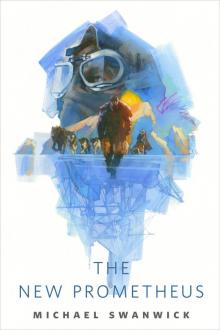 The New Prometheus
The New Prometheus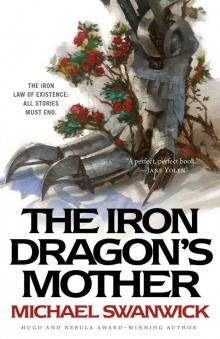 The Iron Dragon’s Mother
The Iron Dragon’s Mother The Mongolian Wizard Stories
The Mongolian Wizard Stories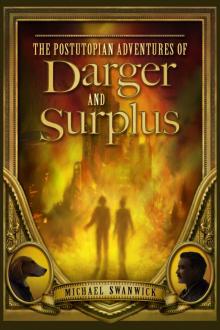 The Postutopian Adventures of Darger and Surplus
The Postutopian Adventures of Darger and Surplus Day of the Kraken
Day of the Kraken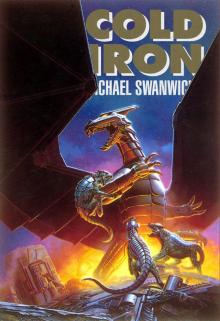 Cold Iron
Cold Iron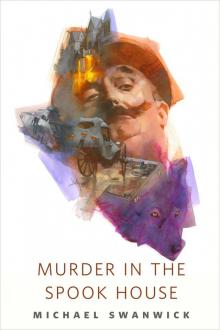 Murder in the Spook House: A Tor.com Original
Murder in the Spook House: A Tor.com Original Radio Waves
Radio Waves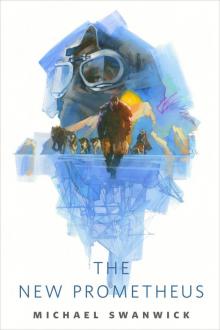 The New Prometheus: A Tor.com Original
The New Prometheus: A Tor.com Original Stations of the Tide
Stations of the Tide Vacuum Flowers
Vacuum Flowers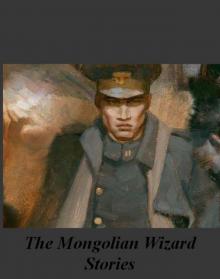 The Mongolian Wizard Stories (online stories 1-7)
The Mongolian Wizard Stories (online stories 1-7)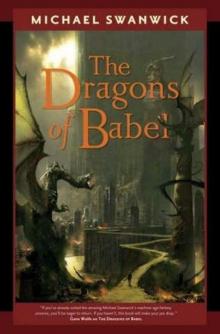 The Dragons of Babel
The Dragons of Babel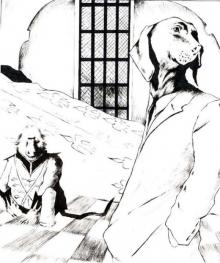 The Dog Said Bow-Wow
The Dog Said Bow-Wow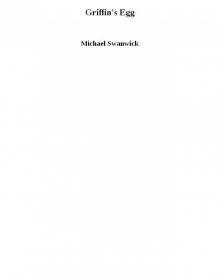 Griffin's Egg
Griffin's Egg The Best of Michael Swanwick
The Best of Michael Swanwick Not So Much, Said the Cat
Not So Much, Said the Cat In the Drift
In the Drift Vacumn Flowers
Vacumn Flowers Slow Life
Slow Life The Wisdom Of Old Earth
The Wisdom Of Old Earth Legions In Time
Legions In Time Scherzo with Tyrannosaur
Scherzo with Tyrannosaur The Year's Best Science Fiction (2008 Edition)
The Year's Best Science Fiction (2008 Edition)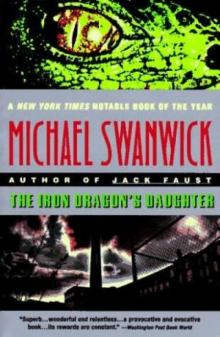 The Iron Dragon's Daughter
The Iron Dragon's Daughter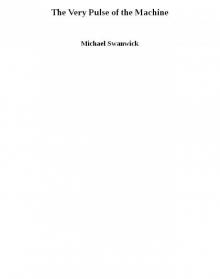 The Very Pulse of the Machine
The Very Pulse of the Machine Zeppelin City
Zeppelin City Dancing with Bears
Dancing with Bears Bones of the Earth
Bones of the Earth Tales of Old Earth
Tales of Old Earth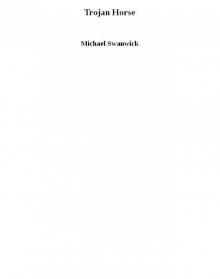 Trojan Horse
Trojan Horse Radiant Doors
Radiant Doors